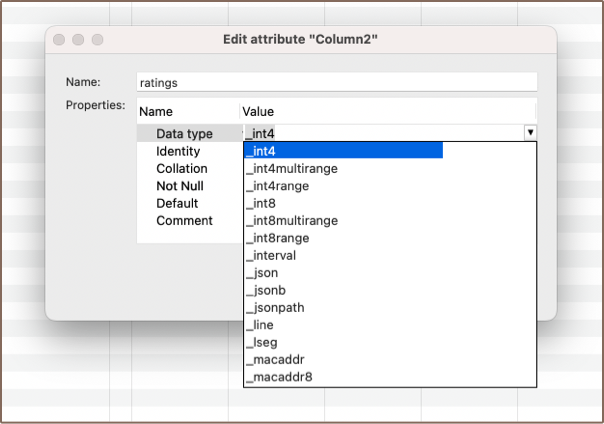PostgreSQL Arrays
DBeaver offers support for array data types in managing PostgreSQL databases. This feature enables the storage of multiple values in a single variable, allowing for more efficient and organized data management. A complete list of types is available in the Edit Attribute window in the data type selection dropdown when creating a column.
The representation of these array data types in DBeaver requires a specific notation. An underscore _ is placed before
the data type, distinguishing array data types from scalar ones.
Creating Array column
You have the flexibility to create an array column either via the Properties Editor or the SQL Editor in DBeaver.
In the Properties Editor, navigate to the Edit Attribute window. Choose your desired array data type,
For an array of integers, such as _int4, from the data type selection dropdown.

Alternatively, you can execute a script in the SQL Editor to add an array column to an existing table. For example, the following command will add a new integer array column called 'ratings' to your table:
ALTER TABLE film ADD ratings _int4 NULL;
Creating Array Data
Once the table is created, you can use the SQL script in the SQL Editor to insert data into the array column. For example, this script utilizes the array constructor with nested arrays:
INSERT INTO film (film_title, ratings)
VALUES ('Inception', array[array[8, 9], array[7, 9], array[8, 10]]);
This script, "Inception" has received three sets of ratings. Each set could represent ratings from a different platform or group of users, for example. Each set contains two ratings, in this case.
Modifying and Querying Array Data
Once you've established an array column, DBeaver allows you to modify and query the array data just like you would
perform any other operations in PostgreSQL. You can use standard SQL commands like UPDATE, INSERT, and SELECT to
manipulate and retrieve data from your array columns. The array data is treated the same way as any other data type in
PostgreSQL, granting you all the flexibility of SQL operations.
